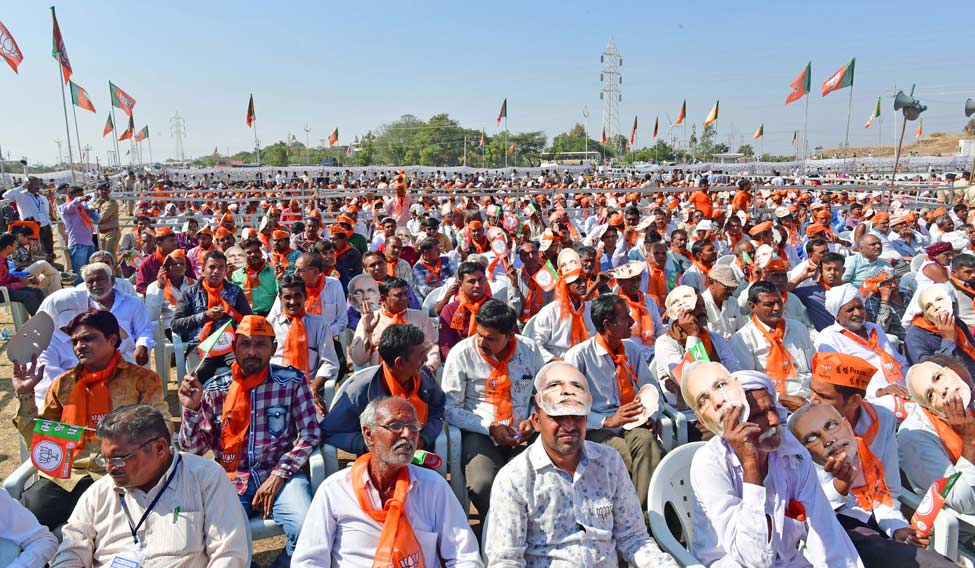The jibes and punches were coming thick and fast from both sides. Some sharp and well aimed. Others ugly and below the belt. But then, this is a no-holds-barred contest. And surprisingly for Gujarat, an almost evenly matched slugfest.
So, when Congress vice president Rahul Gandhi, during his whirlwind campaign in the state, saw magicians hired by the BJP canvassing for votes, he quipped, “Ek jadugar kya kam tha ke BJP aur jadugaro ko laai hai?” (Was one magician not enough that the BJP has roped in more?).
Rahul was, of course, referring to Prime Minister Narendra Modi. And, perhaps he was right. The BJP, facing its most daunting electoral challenge in Gujarat in 22 years, does not need other magicians. Its magician is already in Gujarat and, like always, has been using his sleight of hand to slight the Hand.
On November 27, for instance, campaigning at Jasdan, about 50km from Rajkot, Modi said: “Chawala e tamari gaddi lai lidhi. Shu vaarsa ma lakhayeli hati?” (A tea vendor took away your throne. Was it hereditary?). The front rows of the modest gathering started chanting his name. Modi resumed: “They [the Congress] keep sending me messages that they will make me sell tea again. I said I will sell tea again, but won’t sell the nation.”
A few days later, at Morbi town in Saurashtra, Modi told the audience about the time when Indira Gandhi had visited the region in 1979, with a “hanky over her nose”.
On December 5, at a rally in Dhandhuka, he said: “Kapil Sibal, a Congress MP, argued the Babri Masjid case in the Supreme Court yesterday. He can argue in court, but is it right for him to ask for postponement of the hearing till 2019? Why is he linking elections with Ram Mandir?”
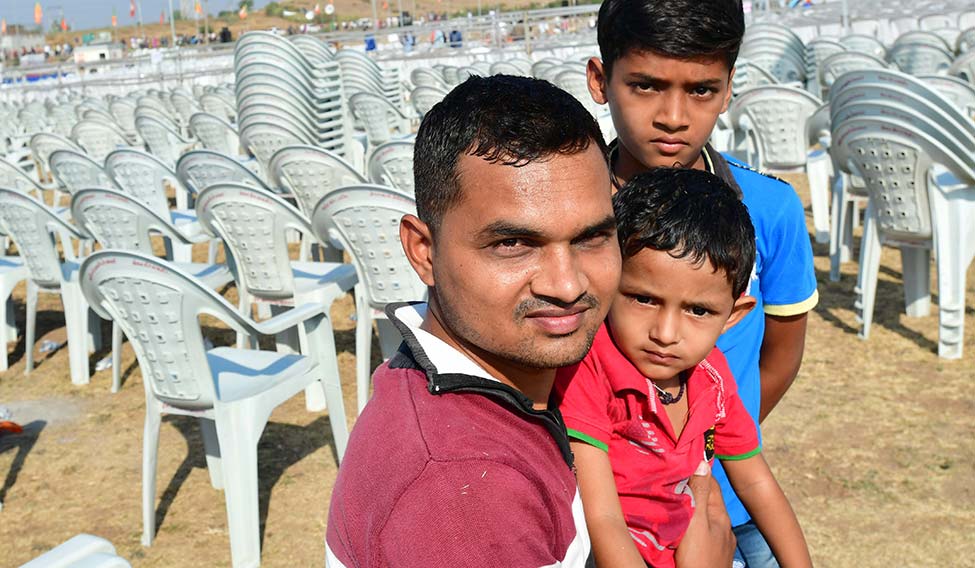 Jayeshbhai Parmar says there is nothing worthwhile in Modi’s development claims | Janak Bhat
Jayeshbhai Parmar says there is nothing worthwhile in Modi’s development claims | Janak Bhat
On several other occasions, the former Gujarat chief minister has bashed the Congress, even comparing Rahul’s imminent elevation as party president to the dynastic succession among Mughal rulers. “I congratulate the Congress on their ‘Aurangzeb Raj’,” he remarked, the sarcasm as evident as his confidence.
As a seasoned campaigner, Modi knows the tricks. He will roar in anger, make jibes with glee, mute himself for azan and, if need be, shed a few tears.
As Gujarat elects 182 MLAs to its assembly, on December 9 and 14, the BJP’s fortunes depend on Modi, as well as his foot soldiers, who are expected to mobilise voters at the booth level.
The BJP’s eleventh hour appeal would be based on Gujarati pride. The BJP cadres have already gone into overdrive, spreading the rhetoric. The country’s prime minister is a Gujarati, they say, as is the BJP president. If they lose, Gujarat loses.
They are also telling voters that a BJP loss could put the jobs of Modi and Shah in jeopardy, as many Hindi-speaking party MPs could call for their heads. If the party doesn’t keep its promises, they could punish it in the 2019 Lok Sabha elections, they offer.
Moreover, the BJP has been selling the idea that having the same government at both the state and the Centre would benefit Gujarat. It has also been playing up the fact that the BJP defeated the Congress in the civic polls in Rahul’s constituency of Amethi, in Uttar Pradesh.
It is simple. If the BJP wins, it is Modi’s victory. If it loses, or concedes a lot of ground, it will be Modi’s loss, a loss of face. Though BJP president Amit Shah set his men a target of 150 seats, even he would know that his ask is farfetched. After all, no party has ever crossed the 150 mark. The best result was in 1985, when chief minister Madhavsinh Solanki, a Congress veteran, managed 149. Even in 2002, when Gujarat was highly polarised after the Godhra riots, the BJP won only 127 seats, the highest in its history.
It is 2017 now, and the issues are more varied. The Congress is witnessing a resurgence, especially after party leader Ahmed Patel’s victory in the Rajya Sabha elections. A major boost to the party is its alliance with three young, influential leaders—Patidar Anamat Andolan Samiti convener Hardik Patel, OBC leader Alpesh Thakore and dalit leader Jignesh Mevani. The Congress also has a tie-up with Chhotubhai Vasava, a strong tribal leader from south Gujarat.
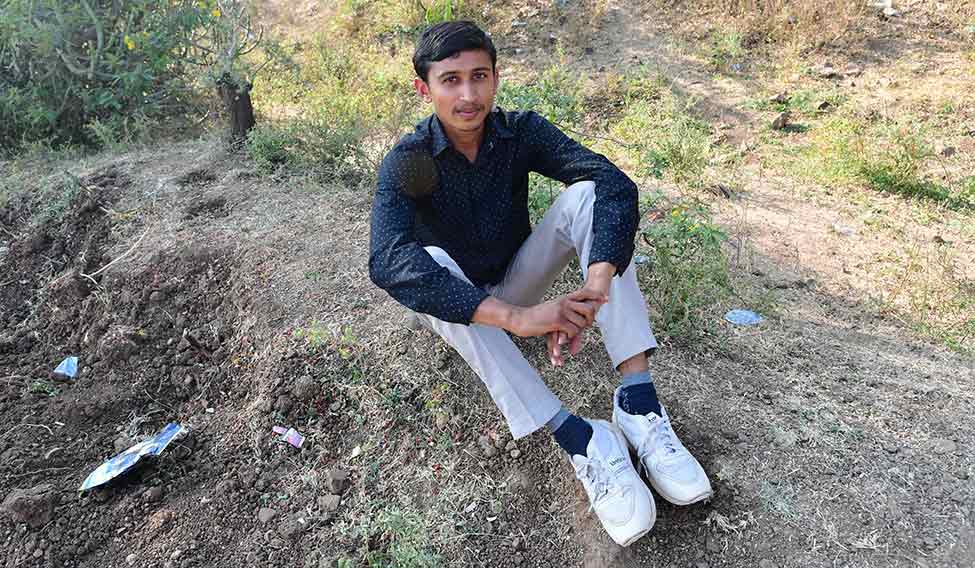 Disconnect, discontent: Bhavesh Sapra, 23, says there are no government jobs in the state | Janak Bhat
Disconnect, discontent: Bhavesh Sapra, 23, says there are no government jobs in the state | Janak Bhat
Another thorn in Modi’s side is the growing popularity of Rahul. He has struck a chord with the Gujarati voter and, if the Congress wins, he could become a threat to Modi at the Centre.
Interestingly, a recent survey gives the BJP and the Congress 43 per cent vote share each. Though the BJP still has an edge of about 10 to 15 seats, its support, at least according to surveys, has weakened over the past few months.
All this has to be playing on Modi’s mind.
Perhaps that’s why, at the Jasdan rally, Modi talked at length about his pet topic—development. He said he had sat on a fast to get approval for the Narmada dam, and had brought Narmada waters to the region through a project called SAUNI (Saurashtra Narmada Avataran Irrigation).
However, barely a kilometre from Modi’s podium, Dinesh Kukadia, 30, is still waiting for the water. “We haven’t got the benefit of the SAUNI project the prime minster is talking about. The pipeline has been laid at a different place and it does not benefit our village,” he said, adding that if they get the Narmada waters, their income could increase threefold. A majority of the farmers in his village, dependent on rains for irrigation, grow only one crop a year. Kukadia, who owns 2.8 acres, said that the minimum support price for cotton and groundnut was not enough; he wanted a price that would reflect the effort put into growing the crops.
Another nearby resident Jayeshbhai Parmar, 27, came to the Modi rally with great excitement, but said he found nothing worthwhile in Modi’s claims of development. “There has been no development for the middle class. Only the business class has progressed,” he said. Parmar, a diamond polisher, earns Rs 8,000 a month and his father, who does odd jobs, earns around Rs 6,000 a month. Together, they feed a family of six. Holding his three-year-old son in his arms, he said: “The prime minister talks about housing schemes, but what we have experienced is that the names of only those associated with the BJP come out [of the lot].”
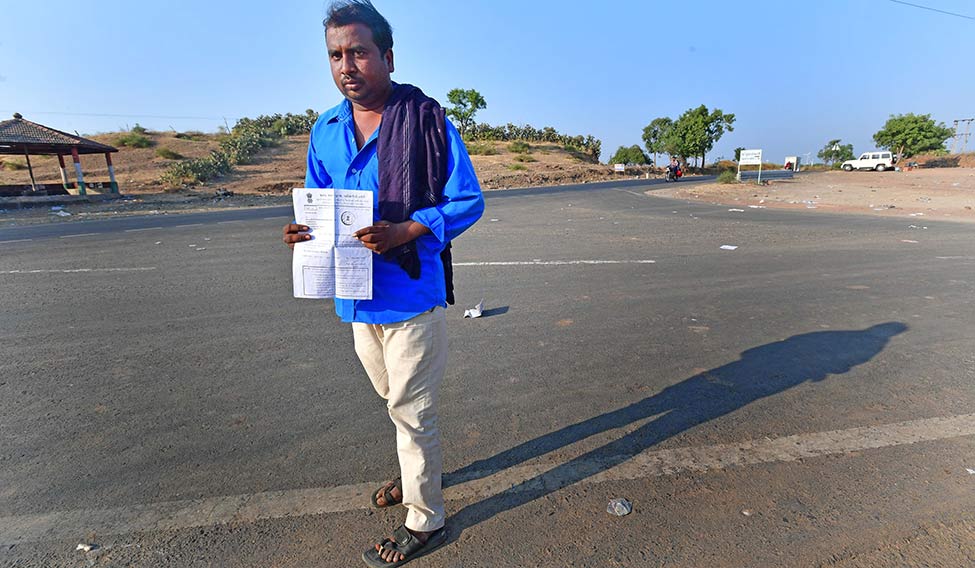 Hopes and promises: Mukesh Bavaliya is yet to receive a bicycle the government had promised him months ago | Janak Bhat
Hopes and promises: Mukesh Bavaliya is yet to receive a bicycle the government had promised him months ago | Janak Bhat
In June, at a programme in Rajkot, Mukesh Bavaliya, 27, was named as one of the disabled people who would receive free government aid. Bavaliya, who came to listen to Modi in Jasdan, told THE WEEK that, on that day in June, it had poured heavily and they were told to return to their village. “We were also told that the appliances would reach us,” he said. “I have not got the bicycle and there is no response to the phone calls I make.”
Bhupat Makwana, who accompanied Bavaliya to Rajkot, said: “It can be an administrative hitch; the prime minister gives a lot of importance to divyangs (differently abled).”
Perhaps to address such grievances, the state government had recently announced schemes and benefits to the tune of Rs 11,000 crore. “Had they done development works earlier, such announcements would not have become necessary,” said Bhavesh Sapra, 23, who makes bangle boxes.
Though the government recently promised more jobs, Sapra’s education—he is a 12th pass—might make him ineligible for a government job. “But, otherwise also, where are the government jobs?” he asked.
Though the state government often highlights its development statistics, the human development indices leave much to be desired, said Hemant Shah, an Ahmedabad-based economist and professor. Quoting government figures, he said that, in 2007, 16.30 lakh children enrolled in class 1. In 2017, however, only 11.80 lakh children appeared for the class 10 examination. “Where have the remaining 4.50 lakh children gone in Vibrant Gujarat?” he asked. In health care, quoting the National Family Health Survey of 2015-16, he said: “In 2015-16, only 50.4 per cent children in the age group of 12 to 23 months were totally immunised.”
The only development, according to him, was the 24-hour supply of single-phase electricity to rural areas. “Though the BJP diverted a chunk from the farm sector to provide electricity to the villages, it has been done,” he said.
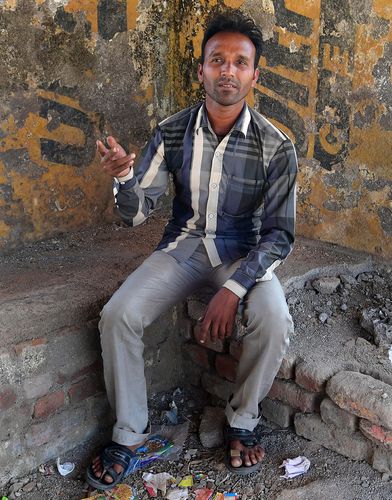 Dinesh Kukadia says he has not got any benefits of the Narmada project | Janak Bhat
Dinesh Kukadia says he has not got any benefits of the Narmada project | Janak Bhat
As for the highly debated financial moves—demonetisation and the Goods and Services Tax—Modi himself knew that there would be backlash. “A new shoe bites. We have the capacity to understand the questions and effect the changes,” he said in Jasdan. The new shoe did bite, and has refused to let go. In the electorally important Surat, for instance, textile traders and those in the diamond industry have been hit hard. How this translates into votes, or lack of them, remains to be seen.
Modi, however, can rest assured that a certain segment of the electorate—the Modi bhakts—would always jump to his defence. “Basic time is needed [to implement GST],” said Prashant Pillai, a Malayali who works in Ahmedabad. “For example, you can’t expect a child to be out of mother’s womb in three months. Change does not happen overnight. I see Modi as one of us. He is one of us up there.”
In the anecdote about Indira Gandhi, Modi had said that the RSS workers in the area did not cover their noses. Soon, however, there were reports saying that Indira did cover her nose, but it was because she had gone there in the aftermath of a severe flood, which had left many dead bodies in its wake. A picture of the incident showed RSS workers also covering their noses. “Maybe this [Modi’s speech] was required for political reasons. Everybody is not perfect and a saint,” said Samir Pandit, a programme manager at a multinational company. He said that he accepted Modi even with his “imperfections”.
The Congress is aware that it cannot change the mindset of such voters. It is, therefore, banking heavily on its new allies. In fact, Congress spokesperson Randeep Surjewala said that the party was “on the finish line” and hoped to cross it with the support of the voters.
Though nobody has predicted a Congress win, the tension in the BJP camp is palpable. Modi has been fast and furious, making regular two-day visits to address public meetings. On each day, he addresses three to four meetings. In each meeting, he covers four to five assembly segments, said Bharat Pandya, state BJP spokesperson. The plan, said party sources, was to cover all the 182 assembly segments. Pandya was confident, saying that the Congress had no issues to raise and that, after the recent revision in rates, GST had become a non-issue in Gujarat.
Recent developments, however, suggest otherwise. Almost the entire Union cabinet is in Gujarat and Amit Shah has not returned to Delhi after Diwali. Apart from addressing public meetings, Shah has brainstormed behind closed doors, chalking out strategies till the night before the nominations for the second phase were to be filed, on November 27.
Given the discontent among the Patidars and the OBCs, it was difficult for the BJP to strike a balance. So much so that several party leaders, who were told that they would contest, were denied tickets at the last moment. A source close to Narhari Amin, who had switched to the BJP from the Congress a few years ago, told THE WEEK that Amit Shah had called him late on November 26 to tell him that he would not be given a ticket. Apparently, this was despite Modi and Shah having earlier promised him the spot. Former minister of state for home Gordhan Zadafia, a Patidar leader, met with the same fate. The source said that the leaders were told that if they were given tickets, there would be a rebellion within the party.
However, despite such efforts, 24 BJP members have rebelled, opting to contest as independents. They have been suspended.
Also, this time, the BJP is keen on playing it safe with candidates. A few years ago, in the local elections, Modi had put up new candidates in five municipal corporations, and yet the BJP had won with a thumping majority, said a BJP leader. Not this time. In fact, the BJP has not even dared to experiment in two of its safest seats—Manjalpur and Sayajiganj—both in Vadodara. Interestingly, Modi had won the Lok Sabha election from Vadodara.
“Modi can do anything to ensure that the Congress does not win,” said sociologist Gaurang Jani. “A Congress win would mean that the BJP will have trouble in the form of Rahul Gandhi at the national level.” Moreover, if the BJP loses Gujarat, intra-party rumbling would increase, which could affect the results of several upcoming state elections.
Modi, however, knows the pulse of the people. They say a true magician never reveals his secret. Who knows, maybe Modi has some more tricks up his sleeve.




